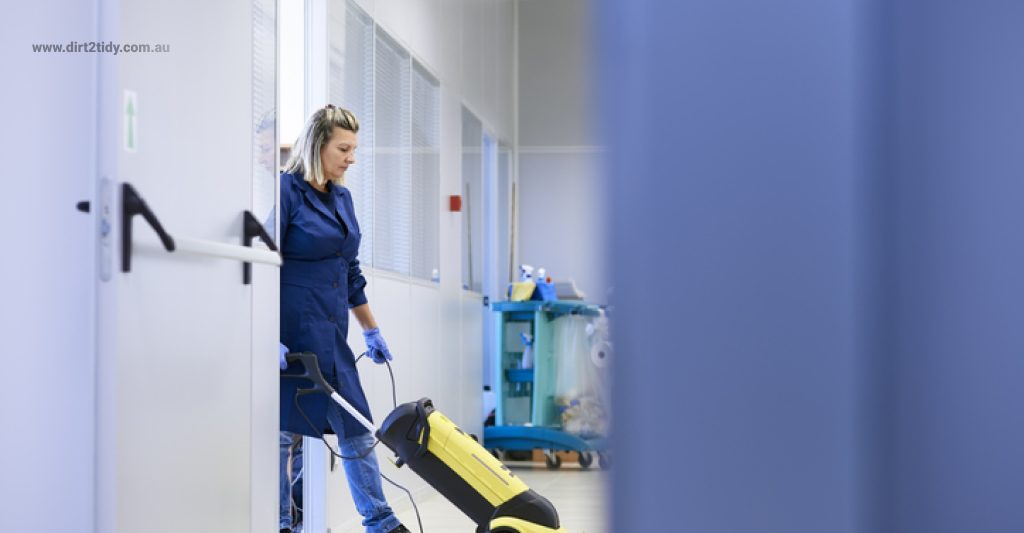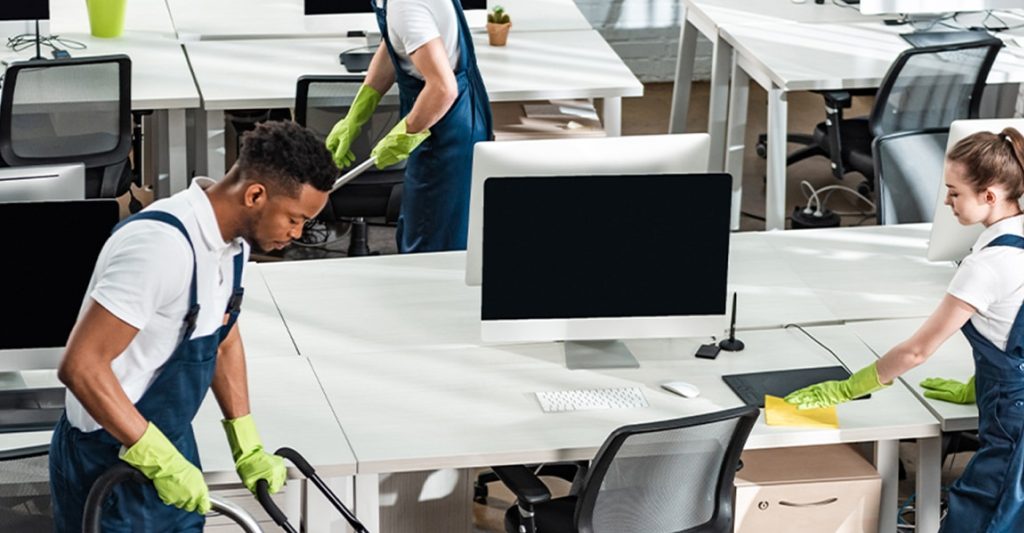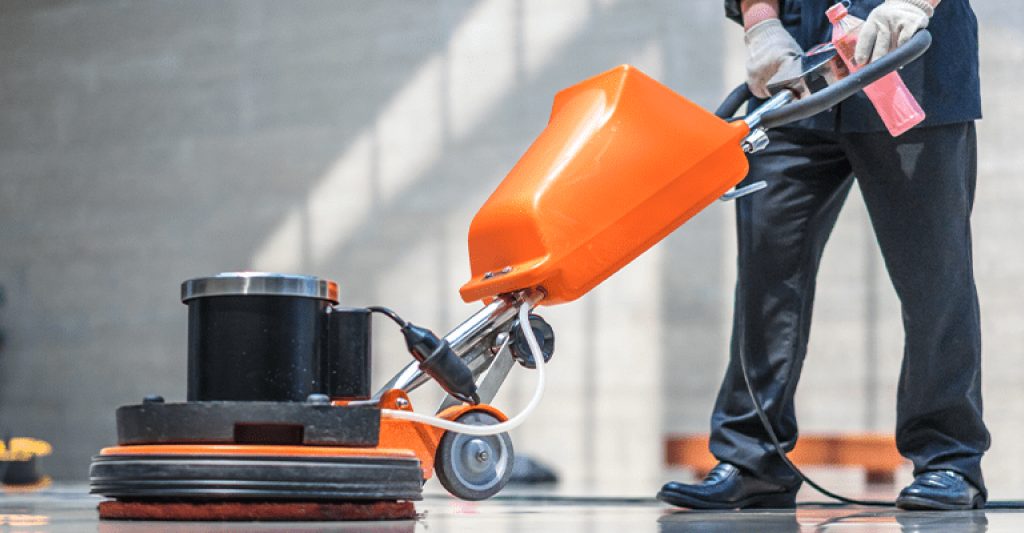Table of Contents
Commercial cleaners are vital to maintaining the cleanliness and hygiene of various commercial and business establishments. They are individuals or companies responsible for keeping places like offices, schools, restaurants, hotels, and hospitals in pristine condition. This post explains the job of a commercial cleaner from a professional cleaning company for proper cleaning.
Do All Commercial Cleaners Offer Graffiti Removal Services?
Not all commercial cleaning companies provide graffiti removal. The availability of this service can vary significantly depending on the provider you choose.
Many cleaning businesses specialize in general maintenance tasks, but only some have the expertise or equipment to tackle graffiti. For those that do, they often employ a variety of methods to ensure effective removal:
- Chemical Solutions: Specialized chemicals are frequently used to break down paint without damaging the underlying surface.
- High-Pressure Washing: This technique uses powerful jets of water to blast away graffiti, proving effective on sturdy surfaces but less suitable for delicate areas.
- Manual Scrubbing: For certain scenarios, using hard-bristled brushes on non-sensitive surfaces can effectively scrub away unwanted paint.
If graffiti removal is a priority, it’s crucial to seek out cleaning providers that specifically mention this service.
It lists the main commercial cleaner work duties, tasks, and obligations. It also lists the main prerequisites for commercial cleaner applicants to be interviewed or recruited for office cleaning.
Commercial Cleaners Do What?
Commercial cleaners dust, wash, disinfect, and refill according to management requirements. They ensure that various establishments, ranging from bustling office spaces to serene hotels, are clean and welcoming for clients and employees alike.
His/her duties include heavy duty vacuum cleaners for floors in a large commercial building, cleaning restrooms, replenishing paper goods, empty trash, and changing bags as needed.
The cleaner is one of the most important employees in a commercial firm or organisation because he/she keeps the place clean and ready for transactions and client services.
Commercial cleaners offer a variety of specialized services specifically for window or glass cleaning. These services are tailored to meet the needs of establishments such as restaurants and offices, which often have extensive glass features.
Here’s a closer look at what you can expect:
- Interior Window Cleaning: This involves removing smudges, fingerprints, and dust from the inside surfaces of windows for a crystal-clear view.
- Exterior Window Washing: Often performed with high-reach tools or water-fed poles, this service addresses the outside of windows, making even multi-story façades sparkle.
- Glass Door Polishing: Whether it’s a sliding door or a grand entryway, ensuring these features are spotless enhances the overall aesthetic appeal.
- Additional Attention to Details: This includes cleaning window sills, frames, and tracks, which is crucial for maintaining the integrity and appearance of the entire window installation.
- Safety and Environmental Considerations: Many professional cleaners use eco-friendly products and adhere to safety protocols, especially important in high-rise operations.
These services are essential not just for appearance but also for the maintenance of the glass, ensuring longevity and performance.
Commercial Cleaners Are the Unsung Heroes of Businesses
Thus, a commercial cleaner is a professional that cleans and maintains an organisation or business to help it develop and retain customers.
But their role extends far beyond that. Hiring commercial cleaners offers a multitude of benefits that contribute significantly to a business’s success.
- Environmentally Clean: Their expertise ensures that dirt, dust, and grime are consistently kept at bay, creating a pristine environment for both employees and clients.
- Workplace Maintenance: Regular cleaning also aids in the overall upkeep of the workplace, preserving property value and preventing deterioration.
- Health and Well-being: A clean environment helps maintain employee health, reducing sick days and boosting productivity.
By supporting a healthier, more appealing workspace, commercial cleaners play a crucial role in enhancing customer experience and satisfaction.
The commercial cleaner from cleaning services must also use the organisation’s cleaning checklist to complete all the standard tasks.
Such as dusting furniture, equipment, partitions, walls, and so on, disinfecting and cleaning sinks, countertops, floors, toilets, mirrors, tables, chairs, microwaves, refrigerators, and so on in restrooms or kitchens, and ensuring that supplies in restrooms, break rooms, or kitchens are stocked.
In addition to maintaining cleanliness, commercial cleaners provide essential support by actively monitoring and replenishing cleaning and hygiene supplies. This service alleviates the burden on office managers, who no longer need to track inventory or worry about reordering.
Key supplies monitored and replenished include:
- Toilet paper products
- Hand soaps
- Feminine hygiene products
In common areas like kitchens or dining spaces, they ensure that:
- Paper towels
- Dish soap
- Trash bags
are consistently stocked. This comprehensive service ensures that all areas remain fully equipped and operational, contributing to a seamless and hygienic work environment. By integrating these tasks into their routine, commercial cleaners offer a complete package of cleanliness and convenience.
Commercial cleaners report safety and maintenance issues to clients, customers, personnel, and management.
They play a crucial role in maintaining a safe and presentable workplace by identifying various problem areas. These professionals are trained to notice issues such as damaged furniture, stained carpets, or even pest infestations.
By spotting these problems early, they ensure that issues are reported to the right person—usually a manager or the business owner—so that they can be addressed promptly. This proactive approach helps maintain the workplace’s overall quality and safety, ultimately contributing to a more efficient and pleasant environment for everyone involved.

Why Painting Over Graffiti Isn’t a Sustainable Solution
Painting over graffiti might seem like a quick fix, but it poses several long-term challenges. Here’s why:
- Layering Issues: Every time a surface is repainted, additional layers of paint are applied. Over time, these layers can build up, leading to uneven, bulky surfaces.
- Peeling Problems: The additional layers don’t just create bulk. They are prone to peeling and chipping as they weather, leaving the wall looking shabby and deteriorated.
- Repeat Vandalism: Graffiti-prone areas often get tagged repeatedly. Simply painting over doesn’t address the root cause of the problem and can invite more graffiti back.
- Maintenance Costs: Constantly repainting requires ongoing expense and effort. Regular upkeep is necessary, which can quickly add up in terms of both time and resources.
- Aesthetic Concerns: As layers build and begin to peel, the overall appearance can become unappealing, detracting from the area’s visual appeal.
By understanding these pitfalls, property owners and managers can seek more durable and visually pleasing solutions to combat graffiti vandalism.
Understanding Deep-Cleaning Needs Across Commercial Spaces
In today’s world, ensuring a clean and safe environment is crucial for every commercial space. However, the deep-cleaning demands can vary significantly depending on the type of establishment.
Why Deep-Cleaning Is Essential
Standard sanitation isn’t always enough to tackle stubborn germs and viruses. Especially in the wake of the COVID-19 pandemic, deep-cleaning has become a critical service. It goes beyond regular cleaning to provide a thorough disinfection, ensuring a safer environment for everyone. Commercial cleaners don’t just keep business establishments free from dirt and grime, they also ensure that everything is sanitized. With the help of safe and EPA-approved chemicals and disinfectants, they maintain high standards of sanitation. This is particularly important in schools and restaurants, as well as during health crises like disease outbreaks.
Sometimes, the usual sanitation procedures are not enough to kill viruses and germs. In these situations, deep-cleaning becomes necessary to effectively eradicate pathogens that standard methods might miss. This kind of service has gained particular importance and popularity due to its ability to address the heightened hygiene demands during health crises.
Specific Requirements by Establishment Type
- Healthcare Facilities
These spaces require the most rigorous deep-cleaning schedules. They demand advanced infection control measures and frequent deep-cleaning sessions to prevent the spread of illnesses and protect vulnerable patients. - Offices
While not as intensive as healthcare facilities, offices benefit from regular deep-cleaning to maintain a healthy workspace. It’s especially important after cases of contagious illnesses to ensure a germ-free environment for employees. - Retail Spaces
With high foot traffic, retail stores should implement frequent deep-cleaning to maintain hygiene standards, particularly in customer-interacting zones like checkout counters and fitting rooms. - Restaurants and Cafés
Food service establishments must adhere to strict hygiene standards, requiring regular kitchen deep-cleaning alongside dining areas to prevent cross-contamination and comply with health regulations. - Educational Institutions
Schools and universities should plan deep-cleaning during periods of low occupancy, such as weekends or school breaks, focusing on classrooms, cafeterias, and common areas to inhibit the spread of germs among students and staff. By understanding the unique cleaning needs of each establishment type, businesses can ensure they meet industry standards and maintain a safe, inviting atmosphere for everyone involved.
When Is Intensive Deep-Cleaning Necessary?
Any establishment should consider an intensive deep-cleaning if a highly contagious disease is detected on the premises. This helps in containing the spread and safeguarding the health of everyone involved.
In summary, while the need for deep-cleaning varies, it remains an indispensable part of maintaining public health in any commercial setting. By tailoring the cleaning routine to specific requirements, establishments can ensure a safer environment for their patrons and staff alike.
Handling Diverse Flooring Materials: How Commercial Cleaners Do It
When it comes to maintaining floors, each material demands a tailored approach to ensure longevity and preserve its appearance. Here’s how commercial cleaners expertly tackle different flooring types:
Stone, Ceramic, and Concrete Floors
These robust materials might seem indestructible, but they require gentle handling. The wrong cleaning agents can quickly lead to damage. Commercial cleaners utilize specially formulated solutions that preserve the integrity of these surfaces. For instance, acidic cleaners are avoided on stone to prevent erosion, while concrete cleaners are chosen based on whether the surface is sealed or not.
Hardwood Floors
Hardwood is beautiful yet sensitive. It’s highly susceptible to water damage and can become warped or discolored with incorrect cleaning methods. Commercial cleaners use minimal moisture and avoid steam cleaning entirely. Instead, they opt for microfiber mops and pH-neutral cleaners that gently lift dirt without compromising the wood’s finish.
Carpet Care
Carpets vary widely in materials and pile height, impacting their cleaning needs. Those with shorter fibers are generally easier to maintain, but all carpets benefit from deep cleaning. Professionals use specialized equipment like hot water extraction devices to remove embedded dirt from the carpet fibers. For delicate materials like wool, they select gentle, wool-friendly products to prevent damage.
Special Coatings and Finishes
Many floors come with unique finishes—be it glazed tiles or sealed concretes—that necessitate particular care. Cleaners are meticulous about using non-abrasive products that won’t strip these coatings. Before service begins, they assess the flooring’s finish to ensure the appropriate products and methods are deployed.
Professional Equipment and Expertise
Lastly, the experience and equipment that commercial cleaners bring to the table enable them to handle any surface with finesse. Their comprehensive understanding of each flooring type ensures not only cleanliness but also the preservation of your floors’ aesthetic appeal. Plus, as a finishing touch, they expertly polish floors to restore shine and enhance overall appearance.
For optimal results, it’s crucial to communicate the specifics of your flooring with your cleaning team, ensuring the best care possible.
Special Considerations for Cleaning Commercial Carpets
Cleaning carpets in a commercial environment involves unique challenges and requires special attention to detail. Here’s a comprehensive guide to ensure your commercial carpets remain spotless and last longer:
1. Material Sensitivity
- Short Nap Carpets: Opt for carpets with shorter piles as they are generally easier to clean and more resilient under heavy foot traffic.
- Delicate Fabrics: For wool or other sensitive materials, use cleaners specifically designed for delicate fibers to prevent damage and maintain texture.
2. Regular Cleaning Schedule
- Frequent Maintenance: Establish a routine cleaning schedule. High-traffic areas often require daily vacuuming to prevent dirt buildup.
- Deep Cleaning: Employ deep-cleaning techniques, such as steam cleaning, every few months to remove embedded dirt and refresh fibers.
3. Tailored Cleaning Methods
- Stain Removal: Tackle stains promptly with appropriate spot cleaning techniques to prevent set-in marks. Specific spot treatments may be required depending on the stain type.
- Pro Grade Equipment: Utilize commercial-grade cleaning machines, which are more powerful than consumer models and can handle larger areas efficiently.
4. Environmental Considerations
- Eco-Friendly Solutions: Consider eco-friendly cleaning products that are safer for both the environment and the indoor air quality of your space.
- Ventilation: Ensure good airflow during and after cleaning to rapidly dry carpets and prevent mold growth.
5. Professional Services
- Periodic Professional Cleaning: Engage professional cleaning services periodically. Their expertise and specialized equipment can extend the life of your carpets and keep them looking their best.
By considering these elements, your commercial carpets can withstand daily wear while maintaining their appearance and durability. Prioritizing the right cleaning strategies ensures a healthier, more inviting workplace.
How Do Commercial Cleaners Remove Graffiti?
Commercial cleaners employ various techniques to tackle graffiti removal, ensuring thorough and effective solutions for different surfaces. Here’s a breakdown of the methods they use:
- Chemical Strippers: Many professional cleaners rely on specially formulated chemicals designed to break down the paint without damaging the underlying surface. This method is particularly effective on surfaces that are too delicate for abrasive techniques.
- Pressure Washing: High-pressure water jets are a popular choice for removing graffiti on durable surfaces like brick or concrete. The force of the water can strip away paint quickly and efficiently.
- Manual Scrubbing: For certain surface types, cleaners may use hard-bristled brushes to manually scrub away graffiti. This approach is often reserved for non-delicate materials where extra care is not needed.
Some business owners might consider painting over graffiti, thinking it’s a quick fix. However, this strategy isn’t ideal for long-term results. Layers of paint can accumulate and eventually peel, requiring more frequent maintenance in the future.
By choosing professional graffiti removal, businesses can ensure a more durable and aesthetically pleasing solution, avoiding the pitfalls of temporary cover-ups.
Commercial cleaners need skills that boost efficiency
Good reasoning, practical problem-solving, oral and written communication, interpersonal skills, and time management are some of these qualities.
Commercial cleaners need a high school diploma. Service experience is not required, however, some employers prefer it.
Example/Sample/Template: Commercial Cleaner
Commercial cleaners clean several things. The job description for a commercial cleaner is shown below:
- Dusting, cleaning, and polishing furniture and fixtures
- Applying chemicals and solvents to surfaces to remove stains and grime simply and efficiently
- following all cleaning safety rules
- Cleaning using equipment
- Handling client requests properly
- Seasonal tasks include snow removal, leaf raking, fixing Christmas lights, putting up the Christmas tree, and more General labour tasks for special projects like painting, furniture moving, and other tasks as needed

Using cleaning equipment properly
Maintaining building freight elevator efficiency and weight regulations
Reporting safety equipment maintenance issues to management.
Commercial Cleaner Job Description Resume
If you’re a commercial cleaner who’s applying for a new job, your resume should include a professional experience section.
This area helps you show the recruiter your relevant experience.
If working as a commercial cleaner is relevant to the position you’re applying for or needed by the recruiter, you may use the sample job description above to write your resume’s professional experience section.
Commercial Cleaner Requirements for Career Success
To be interviewed as a commercial cleaner, you must match recruiting standards.
Most recruiters set specific standards for commercial cleaner applicants to meet to hire the best people who can efficiently accomplish the duties, purpose, and objectives of the position.

If you apply for commercial cleaning, these are the main requirements:
Commercial cleaning experience with consumers, clients, or organisations
Janitorial and customer service expertise and extensive knowledge in cleaning products.
Physical fitness allows a professional cleaner to walk, bend, pull, push, and lift large goods and perform other exercises.
Commercial cleaners must politely converse with coworkers and clients and report any difficulties to management.
Good time management, self-management, and organisational abilities help the cleaner stay calm and finish cleaning and maintenance on time.
High school diploma, preferably in management.
Conclusion
If you’re a recruiter or HR manager hiring a commercial cleaner, you’ll need to explain the job’s obligations.
Use the following job description sample to create the appropriate commercial cleaning job description for your company.
This page also helps prospective commercial cleaners learn about the job and make career options.





